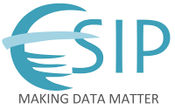ESA 2018 Data Help Desk
Jump to navigation
Jump to search
| Quick Links for ESA Help Desk Ecological Society of America | |
|---|---|
|
| |
| Date: August 6-10, 2018 New Orleans, LA | |
| Agenda | |
| Resources | |
About the Data Help Desk
Ecological data repositories and data specialists will collaborate at the ESA 2018 meeting in New Orleans to add a Data Help Desk to the Poster/Exhibition Hall. The Environmental Data Initiative (EDI), iDigBio, Earth Science Information Partners (ESIP), DataCite, DataONE, and Arctic Data Center will offer three types of assistance:
1) Data Reference Desk - For general information management and data discovery and use questions.
2) Meet the Expert - One-on-one sessions. Stop by the Help Desk and make an appointment!
3) Presentations/Software demos - About ecological data topics ranging from data repositories to analytical tools to creating metadata.
Schedule of Presentations/Software Demos
| Time | Speaker | Title | Abstract |
|---|---|---|---|
| 11:30 | Nancy Hoebelheinrich | Finding Convenient and Curated Research Data Management (RDM) Training... When You Need It! | This session will illustrate how the ESIP-hosted Data Management Training Clearinghouse can help members of the research team locate pertinent educational resources on RDM topics when they are needed. Specific filters will be highlighted that can help speed up the process of finding targeted online educational resources. |
| 12:00 | LUNCH | ||
| 1:30 | Amber Budden | Creating Effective Data Management Plans for Ecological Research | Introduction to the critical components of effective data management plans, with consideration of the ways in which your plan can be tailored to the size, duration, and breadth of your project. We will introduce to the DMPTool, a tool that provides multiple funder templates that can be adapted to meet individual needs. |
| 2:30 | Margaret O'Brien | Harmonizing ecological community data sets for synthesis | A content or design pattern helps you organize data of a particular type so it is easier to work with, and integrate with other data. EDI has a design pattern for community survey data which we will describe and demonstrate. |
| 3:30 | Karl Benedict | Introduction to Jupyter Notebooks | Have you wished for the ability to add live blocks of executable code and dynamic graphics in your word processor? Have you every wanted to write some nicely formatted text in the middle of your analysis code? Do you need to quickly present results from a new analysis to colleagues? Then, Jupyter Notebooks may be for you. This workshop will provide an introduction to notebook concepts and use. |
Tuesday
| Time | Speaker | Title | Abstract |
|---|---|---|---|
| 11 | Simona Picardi | Handling and managing animal tracking data in R | Animal tracking data are increasingly used in studies of movement ecology, habitat selection, and population ecology. I will present an overview of available tools for handling and analyzing tracking data in R, and provide a demo workflow from data import to some example analyses. |
| 12 | LUNCH | ||
| 1:30 | Matthew Aiello-Lammens | Building better species distribution models with the Wallace R package | The availability of publicly accessible biodiversity data is increasing rapidly as museums and herbaria digitize their holdings, and as citizen science projects mature and expand. These data provide large datasets of species occurrences, which can be analyzed using species distribution modeling approaches. The Wallace R package provides a means to access large datasets and guidance to appropriately build these models using state-of-the-art methods. |
| 2:30 | Patricia Cruse | Where Should I Put My Data: the Repository Finder Tool | Researchers in earth and space sciences often need help identifying an appropriate data repository to deposit their data.The Repository Finder tool helps researchers in the Earth, Space, and Environmental Sciences find an appropriate repository to deposit their research data, using information about more than 2,000 data repositories from re3data. The service is developed as part of the Enabling FAIR Data Project. |
| 3:30 | Karl Benedict | Introduction to distributed version control with Git and Github | Have you ever wished you could go back in time? Needed to share a snapshot of your work with someone while continuing to make changes? If your answer is yes to these questions you might want to consider adding version control to your life. This workshop will provide an introduction to the Git version control system and GitHub as a platform for sharing your version-controlled work (even with just yourself). |
Resources
- Arctic Data Center




